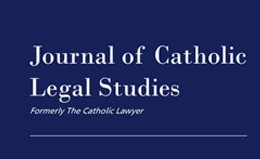Proceedings Published of Conference on Laïcité in Comparative Perspective

The Proceedings of the inaugural conference of the St. Johns’ University School of Law’s Center for Law and Religion, Laïcité in Comparative Perspective, have been published in the St. John’s Journal of Catholic Legal Studies. ICLRS Associate Director Professor Brett Scharffs participated in the panel discussion, which was held at St. John’s Paris Campus on June 11, 2010. The conference brought together scholars from the United States and Europe to examine the French concept of laïcité and to compare it with other models of church-state relations. Participants included Douglas Laycock (University of Virginia), Nathalie Caron (Université Paris-Est Créteil), Blandine Chelini-Pont (Université Paul Cézanne Aix-Marseille), Nina Crimm (St. John’s University), Marc DeGirolami (St. Johns University), Javier Martínez-Torrón (Universidad Complutense, Mark Movsesian (St. John’s University), Rosemary Salomone (St. John’s University), Brett Scharffs (Brigham Young University), Michael Simons (St. John’s University), Emmanuel Tawil (Université Panthéon-Assas (Paris II)), and Elisabeth Zoller (Université Panthéon-Assas (Paris II)). The conference had three sessions, an introductory session with a paper from Professor Laycock, “American Religious Liberty, French Laïcité, and the Veil,” followed by panels focusing on contemporary issues involving laïcité in France, and on laïcité in comparative perspective.
As described in the conference foreword, written by St. John’s Law and Religion Center Director, Professor Mark Movsesian, three primary themes emerged from the discussion. “First, laïcité is a contestable concept that encompasses many discrete, and sometimes contradictory, notions. The word itself is not readily translated into English. Most authors settle for ‘secularism.’ But ‘secularism’ does not capture laïcité’s anti-clerical, even anti-religious connotations. . . . Laïcité historically was a militant concept, a polemic employed by actors who sought to suppress French Catholicism, particularly during the early decades of the Third Republic. Nowadays, this history is largely ignored or forgotten; many French apparently see laïcité as a neutral and irenic doctrine that unites their society. But its origins as a fighting word occasionally resurface . . . .” The second major theme focused on education. “Both in France and in other countries, much of the debate about religion in public life centers on public schools. . . . Both pro- and anti-religionists view public schools as a crucial battleground for shaping future citizens; the stakes are very high. In France, in particular, the public schools traditionally have been seen as the vehicle for forging a common national identity that transcends religious difference and embraces the rationalist values of the Enlightenment. Following Rousseau, public schools traditionally are supposed to free children from religious influence and promote the primacy of the state over the church and other ‘communalist’ attachments.”
The third theme was the importance of history. “France and the United States share a commitment to religious liberty. Both have political regimes that date from the same period. Both are heirs of the Enlightenment. Both are secular states, in the sense that neither has an established religion. And yet, when one compares the ways in which religious liberty is instantiated in the two countries, one discovers significant differences.” These differences can largely be explained by the differences in the history of France and the United States with respect to religion. Although there were various state establishments at the time of the American Revolution, unlike the situation in France, “America never has had an entrenched clerical class to displace or a Gallican-style church to dismantle. From the beginning, American society has been characterized by a religious pluralism and voluntarism that made such a class and church impossible. As a consequence, Americans traditionally have not seen religion as the enemy of liberty, a fact that astonished Tocqueville in the 1830’s. On the contrary, throughout history, many Americans have seen religion as constitutive of political liberty.” The conference proceedings, published in March 2011, are in Volume 49, No. 1 of the St. John’s University School of Law Journal of Catholic Legal Studies (Formerly The Catholic Lawyer), at 1-142.